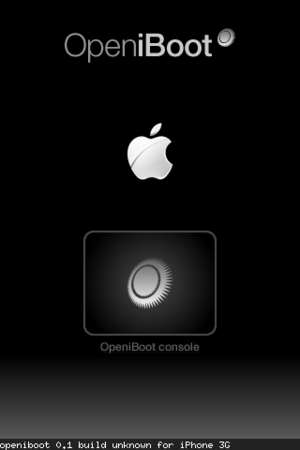 iPhone 3G running the OpeniBoot console. | |
| Developer |
|
|---|---|
| Written in | |
| OS family | Android (Linux-based) |
| Working state | Discontinued[1] |
| Source model | Open source |
| Initial release | 21 April 2010[2] |
| Final preview | Pepparkaka 11.04 (Android 2.3.2), OpeniBoot 0.2 / 23 November 2010[3] |
| Repository | github |
| Package manager | Package Installer |
| Platforms | |
| Kernel type | Monolithic (Linux) |
| License |
|
| Official website | linuxoniphone |
iDroid was a project with goals of porting Linux and Android to iPhone, iPod touch and iPad and use different OSes as alternatives to standard iOS.
iDroid is not actually a hack/exploit neither an unlock, but it is based on Bootrom exploits which allowing the running of unsigned code at low level.
Components
OpeniBoot
The goals of OpeniBoot are:
- to run low-level code
- to have low and critical drivers (NAND and NOR driver, NVRAM...).
- to have a debugger and development environment (chainloading, upgrading itself and USB mass storage).
Linux
A Linux Bootloader, a working Linux kernel (cross-compiler), porting drivers, run Wi-Fi and command line through SSH.
Android
On 21 April 2010, an Android distribution based on iPhoneLinux called iDroid was released.[2]
End of Project
On 11 July 2012, project member Nick Pack referred to iDroid as effectively discontinued for numerous reasons, predominantly the lack of hardware or engineering effort left to support the continued development of the project.[1] The last meaningful commits made to the project occurred on 2 September 2012.
The final release of iDroid supports the three S5L8900-based devices (iPhone (1st generation), iPhone 3G, and iPod touch (1st generation)), and is based on Android 2.3 "Gingerbread". The next release of Android, 4.0 "Ice Cream Sandwich" (the 3.x series was exclusive to tablets), was cited as a challenge to support, because it upgraded the target platform from ARMv6 to ARMv7, meaning that the project needed to either backport Android to run on ARMv6 again, or focus their efforts on the iPhone 3GS and iPod touch (3rd generation).
There were plans to support up to A4 devices, with some code already being pushed for the iPhone 4, iPod touch (4th generation), and iPad (1st generation), but this was never completed.
See Also
External Links
- Linux on the iPhone blog
- iDroid Project website at the Wayback Machine (archived 2014-11-02)
- Installing iDroid at the Wayback Machine (archived 2014-09-27)
References
- ^ a b http://0xdeadfa11.net/blog/2012/07/11/the-idroid-project-where-it-presently-stands [Archived 2014-02-18 at the Wayback Machine]
- ^ a b https://linuxoniphone.blogspot.com/2010/04/ive-been-working-on-this-quietly-in.html
- ^ https://web.archive.org/web/20140923233904/http://www.idroidproject.org/wiki/News
